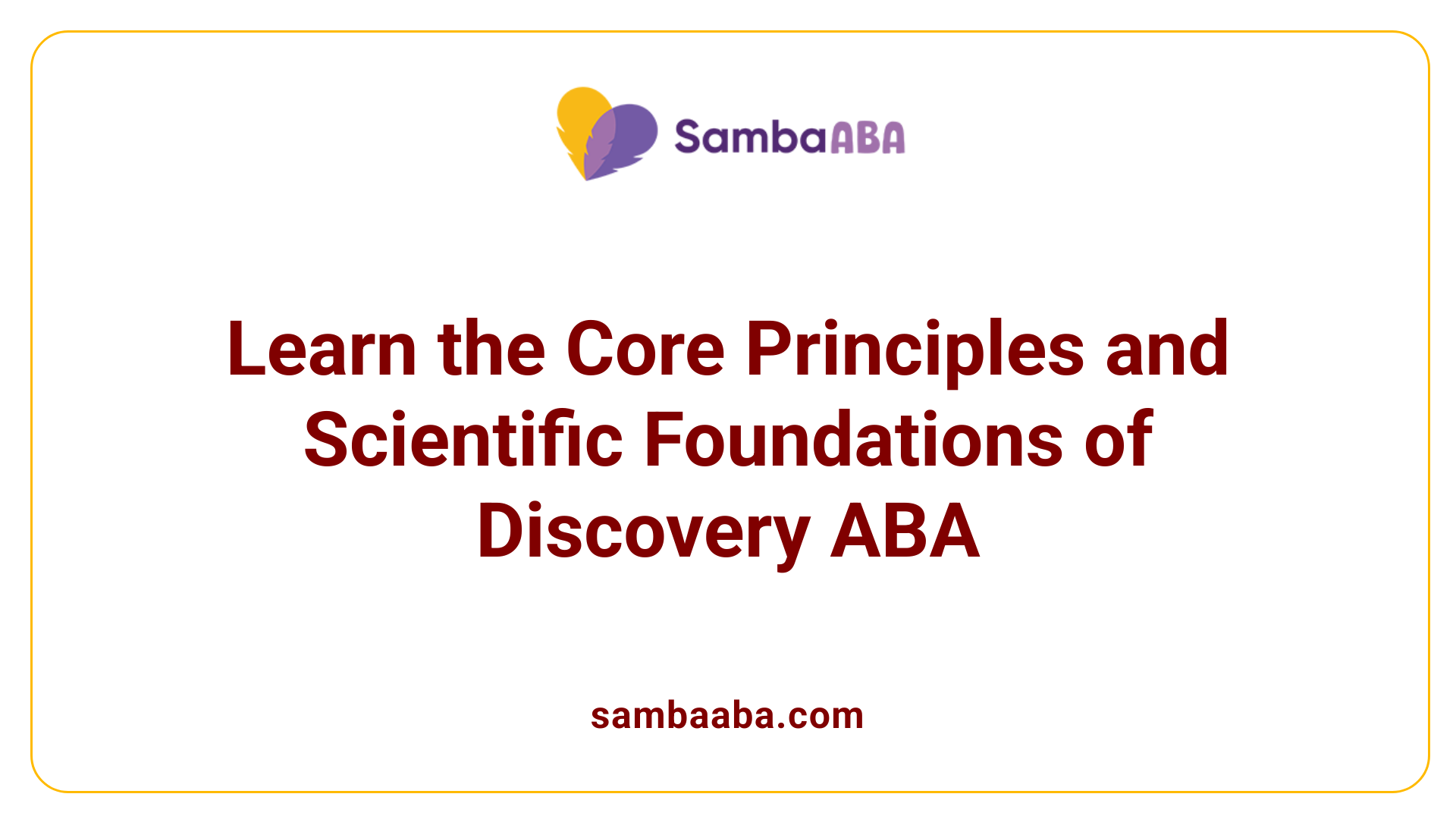What Is Discovery ABA?
Unlocking the Potential of Applied Behavior Analysis
Understanding Discovery ABA and Its Role in Developmental Support
Discovery ABA is a modern, evidence-based approach rooted in the principles of Applied Behavior Analysis (ABA). As a scientifically validated method, Discovery ABA aims to enhance socially significant behaviors, particularly for individuals with autism spectrum disorder (ASD) and other developmental disabilities. This article explores what Discovery ABA is, its core principles, methods, benefits, and how it differs from traditional ABA programs, alongside insights into its educational background and career opportunities.
Fundamentals of Discovery ABA and Its Core Principles

What is Discovery ABA and what are its core principles?
Discovery ABA is a specialized approach within the broader framework of Applied Behavior Analysis (ABA). It is designed to improve socially important behaviors, especially in individuals with developmental disabilities such as autism spectrum disorder. Based on scientific principles derived from behaviorism, Discovery ABA focuses on understanding how behavior is learned and influenced by the environment.
The core of Discovery ABA involves using data-driven methods to evaluate behaviors and implement interventions that promote positive change. It emphasizes teaching functional skills—like communication, social interaction, and self-care—while systematically reducing problematic or challenging behaviors.
This approach employs various techniques such as positive reinforcement, functional communication training, and naturalistic teaching strategies. These methods are integrated into tailored programs that address each individual's specific needs and strengths.
Personalization is a fundamental aspect of Discovery ABA. Treatment goals are customized to fit the unique circumstances of each person, ensuring that interventions are relevant and effective. Qualified behavior analysts, often Board Certified Behavior Analysts (BCBAs), oversee the implementation of these programs to maintain high standards of practice.
Ethics and client welfare are central to all activities within Discovery ABA. The approach adheres to the BACB Ethics Code, which emphasizes principles like beneficence, dignity, integrity, and the competence of practitioners. Overall, Discovery ABA aims to foster independence and meaningful skills development, supporting individuals across different environments such as homes, schools, and community settings.
Methods and Techniques in Discovery ABA Therapy
 Discovery ABA therapy employs a variety of evidence-based methods to enhance learning and reduce challenging behaviors among individuals with developmental disabilities, particularly autism spectrum disorders.
Discovery ABA therapy employs a variety of evidence-based methods to enhance learning and reduce challenging behaviors among individuals with developmental disabilities, particularly autism spectrum disorders.
One primary approach includes Discrete Trial Training (DTT). This structured method involves breaking skills into small, manageable steps and providing clear, consistent prompts and reinforcements to encourage learning. Complementing DTT is Natural Environment Teaching (NET), which focuses on applying learning in everyday settings, making skills more functional and generalized.
Verbal behavior strategies are also central. These techniques utilize prompting—such as verbal cues or physical guidance—and fading to promote independent communication skills. An effective tool used alongside these strategies is video modeling, where individuals observe videos demonstrating desired social interactions or behaviors, which aids visual learners and enhances imitation.
Data collection plays a vital role in guiding intervention decisions. Functional assessments, like ABC (Antecedent-Behavior-Consequence) analysis, help identify the purpose behind behaviors, ensuring interventions are tailored to each person’s specific needs.
To maximize efficacy, interventions in Discovery ABA customize techniques to the individual. This personalized approach considers each person’s abilities, preferences, and behavioral goals, making the therapy more relevant and effective.
| Technique | Purpose | Example |
|---|---|---|
| Discrete Trial Training (DTT) | Structured skill building | Teaching a child to identify colors through repeated trials |
| Natural Environment Teaching (NET) | Generalizing skills in daily life | Practicing requesting items during playtime |
| Verbal Behavior Strategies | Improving communication | Teaching functional speech through prompts |
| Video Modeling | Visual learning enhancement | Watching a video of peer social interactions |
| ABC Data Analysis | Understanding behavioral functions | Recording what happens before and after behavior to determine triggers |
In summary, Discovery ABA integrates these methods to create a comprehensive, adaptable, and effective therapeutic process tailored to each individual’s unique needs.
Benefits and Effectiveness of Discovery ABA

How does Discovery ABA improve communication and social skills?
Discovery ABA focuses heavily on enhancing communication and social abilities, which are often areas of difficulty for individuals with autism and developmental disabilities. Through structured, positive reinforcement strategies, individuals learn to express their needs more effectively and engage in meaningful interactions. The therapy emphasizes natural environment training, allowing skills to be used in everyday settings, which significantly boosts social integration.
Can Discovery ABA reduce problematic behaviors?
Yes, one of the primary goals of Discovery ABA is to decrease behaviors that interfere with learning and social participation. This therapy employs behavior-analytic techniques to identify the triggers of challenging behaviors and replace them with more appropriate responses. Over time, individuals typically show a marked reduction in severe behaviors, leading to a safer and more supportive environment.
How are interventions personalized?
Interventions in Discovery ABA are tailored specifically to each individual’s unique needs and strengths. Assessment processes determine particular skill deficits and problematic behaviors, allowing therapists to design customized treatment plans. This personalization ensures that interventions are relevant and effective, promoting the development of essential life skills, including daily living, academic, and emotional regulation skills.
What are the long-term benefits?
Research shows that early and intensive application of Discovery ABA can lead to improved long-term outcomes such as increased independence and better social skills. Many individuals experience gains in language development, emotional regulation, and adaptive behaviors, which support greater participation in community life and increased quality of life.
Is Discovery ABA supported by scientific research?
Absolutely. The principles underlying Discovery ABA are rooted in scientific evidence from behavior analysis. Multiple studies demonstrate its effectiveness in reducing problematic behaviors, improving communication, and supporting skill development. Its evidence-based framework underpins its status as a trusted treatment for individuals with autism and developmental disabilities.
| Benefit Area | Description | Supporting Evidence |
|---|---|---|
| Communication & Social Skills | Enhances expressive language and social interactions | Studies show improved language use and social engagement |
| Behavior Reduction | Decreases challenging behaviors | Research indicates significant reduction with tailored interventions |
| Individualized Approach | Custom plans based on thorough assessments | Practice shows tailored programs outperform generic ones |
| Long-term Outcomes | Promotes independence and functional skills | Data supports sustained skill improvement over time |
| Scientific Support | Rooted in behavior analytic principles | Widely validated through research and clinical trials |
This personalized, scientifically backed approach makes Discovery ABA a valuable intervention for improving the lives of individuals with autism and other developmental disabilities.
Distinguishing Discovery ABA from Other ABA Approaches
 Discovery ABA represents a distinct approach within the broader field of Applied Behavior Analysis, emphasizing personalized and naturalistic teaching strategies. Unlike traditional methods such as Discrete Trial Training (DTT), which are highly structured, Discovery ABA promotes child-led, play-based interventions that focus on fostering functional skills relevant to everyday life.
Discovery ABA represents a distinct approach within the broader field of Applied Behavior Analysis, emphasizing personalized and naturalistic teaching strategies. Unlike traditional methods such as Discrete Trial Training (DTT), which are highly structured, Discovery ABA promotes child-led, play-based interventions that focus on fostering functional skills relevant to everyday life.
A core feature of Discovery ABA is its integration of family involvement. Caregivers and family members are actively engaged in the intervention process, making the learning more natural and adaptable to the child's environment. This family-centered approach ensures that behavioral improvements are carried over into real-world settings.
In terms of methodology, Discovery ABA demonstrates flexibility. While conventional ABA techniques often depend on rigid, clinician-directed procedures, Discovery ABA adopts a more adaptable stance, tailoring interventions to each child's interests and developmental needs. This customization not only enhances engagement but also broadens the scope of ABA to include social and communicative skills, beyond merely reducing severe problem behaviors.
Training professionals and caregivers is simplified in the Discovery ABA framework, making it accessible for wider adoption outside specialized clinical settings. This approach fits with the lab's overall goal of developing practical training curriculums that can be utilized by various agencies to implement effective, behavior-analytic interventions.
In summary, Discovery ABA's emphasis on personalization, natural settings, and family involvement distinguishes it from more traditional, structured ABA models, offering a more flexible and context-rich approach to behavioral intervention.
Historical Context, Education, and Career Opportunities in ABA

What is the educational content and historical background of ABA as presented by Discovery ABA?
Applied Behavior Analysis (ABA) traces its roots back to the early 20th century, emerging from foundational work in behaviorism by influential psychologists such as John B. Watson, Ivan Pavlov, and B.F. Skinner. These pioneers established core principles of classical and operant conditioning, which underpin ABA’s scientific approach.
The formal recognition of ABA as a distinct discipline occurred in 1968 with the publication by Baer, Wolf, and Risley. Their work outlined core principles emphasizing precise, measurable, and evidence-based interventions to improve behaviors.
In the 1960s and 1970s, ABA was significantly advanced by Dr. Ivar Lovaas, who utilized the approach to develop treatments for autism. His methods, including discrete trial training, led to remarkable improvements in behavioral and cognitive outcomes for children with autism.
As research progressed, ABA shifted away from early use of aversive and punishment-based techniques. Today, it emphasizes positive reinforcement, naturalistic interventions, and ethical practices, making its application more humane and effective.
Discovery ABA highlights this rich history through educational documentaries and courses, providing an in-depth look at how ABA evolved from its scientific origins to its current diverse applications. The focus is on ongoing developments, ethical standards, and the contributions of pioneering figures, offering learners a comprehensive understanding of ABA’s educational background and evolution.
Empowering Individuals Through Evidence-Based Practice
Discovery ABA represents a dynamic and personalized approach to behavioral therapy that is grounded in scientific research and ethical standards. By utilizing versatile methods, emphasizing naturalistic and child-led interventions, and focusing on functional skill development, Discovery ABA effectively supports individuals with autism and other developmental disabilities in realizing their full potential. The program’s commitment to ongoing research, professional training, and public education ensures that clients and caregivers receive the highest quality support. As awareness and understanding of ABA continue to grow, Discovery ABA stands as a pivotal model in improving lives through tailored, evidence-based strategies that foster independence, social connection, and overall well-being.
References
- Applied Behavior Analysis Laboratory - OPWDD - NY.gov
- Applied Behavior Analysis (ABA) | Autism Speaks
- ABA from A to Z: Behavior Science Applied to 350 Domains of ...
- Ethics for Behavior Analysts
- The History of ABA Therapy: Origins and Evolution
- Discover ABA – Discover your child's future
- 6 Life-Changing Benefits of ABA Therapy for Children with Autism
- American Bar Association
- ABA Clinic Operations Manager – Charlotte Job Vacancy ... - Tallo
- Understanding ABA Techniques: 7 Strategies You Need to Know
